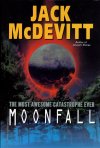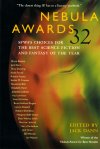 |
REVIEWS
|
 |  | Recent New and Notable
21 May 1998
|
Moonfall, Jack McDevitt (HarperPrism, April 1998, $24.00, hc) The author's sixth novel is a disaster story about a comet crashing into Earth's Moon and spraying debris down on Earth -- a timely subject for the summer of Deep Impact and Armageddon. Gary K. Wolfe, in the May 1998 Locus, sees the novel following the formula of such past Hollywood epics as much as the literary tradition of Wells's ''The Star'' or Niven/Pournelle's Lucifer's Hammer. He writes ''Moonfall is fun at this basic Irwin Allen level, and it could get McDevitt his first real bestseller.''
(Thu 21 May)
|
 |
 |
Flanders, Patricia Anthony (Ace, May 1998, $23.95, hc) The author's seventh novel moves even further into historicity than her previous book, God's Fires. Gary K. Wolfe writes in the May 1998 Locus that Flanders is ''a gripping, brutal World War I battle narrative which virtually does away with all fantastic apparatus except one: the epistolary narrator Travis Lee Stanhope, a Texas sharpshooter attached to a unit of the British Expeditionary Force, is gifted with second sight.'' With a frequency of gruesome war scenes befitting a horror novel, well-researched historical background, and effective pacing and characters, Wolfe finds the book ''a powerful performance from a writer who only becomes less predictable with each successive book''.
(Thu 21 May)
|
|
Komarr, Lois McMaster Bujold (Baen, June 1998, $22.00, hc) The latest Miles Vorkosigan adventure sends Miles to the planet Komarr, where a centuries-long terraforming project is in jeopardy. Faren Miller, in the May 1998 Locus says the book ''may not represent Bujold at her most ambitious and thought-provoking, but once again she has provided us with an intelligent, well-crafted, and thoroughly satisfying blend of adventure, sociopolitcal commentary, scientific experiments, and occasional perils -- this time with that extra spicing of romance''. In the same issue Carolyn Cushman notes the book's focus on mystery instead of space opera, and concludes the book is ''great fun, if not quite as fast-paced and flashy as some of the earlier adventures''.
(Thu 21 May)
|
 |
 |
Child of the River, Paul J. McAuley (Avon Eos, June 1998, $14.00, hc) Subtitled ''The First Book of Confluence'', McAuley's seventh novel is the first of a trilogy of a ''baroquely detailed distant future society set on the artificial strip-shaped world of Confluence, locked into a pseudo-medieval stasis by the weight of its immense history'', in Gary K. Wolfe's description from the December 1997 Locus. (The book was published last year in the UK.) Comparing the book to the work of Gene Wolfe, Gary Wolfe writes that ''McAuley has begun shaping a powerful epic that could be one of the most important in recent SF''.
(Thu 21 May)
|
|
Year's Best SF 3, edited by David G. Hartwell (HarperPrism, June 1998, $6.50, pb) In this third volume of Hartwell's annual anthology, as in the earlier volumes, the focus is on science fiction -- not fantasy, not horror, not slipstream, not postmodern lit -- and on relatively short stories, in contrast to the series' chief rival, Gardner Dozois's massive Year's Best Science Fiction collections. This year Hartwell includes a rather modernist William Gibson story, ''Thirteen Views of a Cardboard City''; Robert Silverberg's best story in years, the alien-invasion tale ''Beauty in the Night''; Michael Moorcock's richly complex ''London Bone''; Terry Bisson's savvy, hilarious take on the future of office computers, ''An Office Romance''; plus excellent works by Greg Egan, Brian Stableford, John C. Wright, Katherine MacLean, and many others. A great bargain for anyone who hasn't kept up with magazine and anthology short fiction recently -- and especially recommended for readers who are primarily interested in true-blue science fiction.
(Thu 21 May)
|
 |
 |
Nebula Awards 32, edited by Jack Dann (Harcourt Brace, April 1998, $13.00, tpb)
Both a collection of Nebula Award winners and nominated stories and a symposium on the state of current SF, with short essays by Lucius Shepard, Elizabeth Hand, Norman Spinrad, and others. Gary K. Wolfe's review in the April 1998 Locus considers the book's stories -- by Jack Dann, Esther M. Friesner, Nicola Griffith, Jack Vance, Jonathan Lethem, Bruce Holland Rogers, and others -- in light of the essayists' complaints that too much current SF consists of bloated fantasy series, media tie-ins, and sharecrops. Or in Lucius Shepard's take, a division among writers between 'storytellers' and 'stylists'. Wolfe observes ironically, considering some recent Nebula-nominated novels, that ''there is some evidence that the field has been dumbed-down and steered away from risk-taking, not only by market forces and thick-skulled editors, but within the Nebula process itself''. Nevertheless, with their selections of stories, essays, Rhysling Award winning poems, and Bill Warren's survey of films, Wolfe concludes that ''the Nebula awards anthologies, far more than the bestseller lists, more even than the Dozois and Hartwell annuals, are a seismograph of SF's soul''.
(Thu 21 May)
|
|  |



